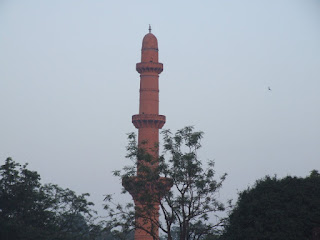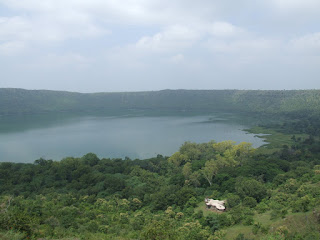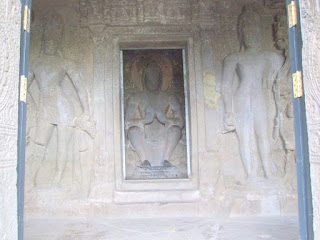Aurangabad-Gateway to some of the most beautiful monuments
Aurangabad is located in a valley watered by the river Dudhna between the Sihyachal and Satara range of hills. The ancient name of Aurangabad is Khirki which means a ‘window’ or ‘entrance.’ Today it is a modern bustling city with that distinct touristic ambience. We made it our base for visiting Ajanta, Ellora and Lonar.
Khuldabad
 Khuldabad is about 27 kms from Aurangabad and about 3 kms from the world famous Ellora caves. The is the the Burhan-ud-din mausoleum where the mortal remains of the Mughal emperor Aurangzeb lie. Aurangzeb chose this place as his burial site and true to his firm belief in his lifetime to avoid any ostentation, also instructed that it should be kept simple. This is his grave.
Khuldabad is about 27 kms from Aurangabad and about 3 kms from the world famous Ellora caves. The is the the Burhan-ud-din mausoleum where the mortal remains of the Mughal emperor Aurangzeb lie. Aurangzeb chose this place as his burial site and true to his firm belief in his lifetime to avoid any ostentation, also instructed that it should be kept simple. This is his grave.Below is the gate to the city of Khuldabad.


Above is the entrance to the mausoleum. Also shown below are pictures of the mosque. Graves of Azam Shah (Aurangzeb's second son) and his wife as well as of other well known muslim saints are to be be found in this complex.





Daulatabad fort
Daulatabad or “City of Prosperity”), is a 14th century fort city about 16 kilometers northwest of Aurangabad. Starting 1327, it famously remained the capital of the Tughluq dynasty, under Muhammud bin Tughluq (r. 1325-1351), who also changed its name, and forcibily moved the entire population of Delhi here, for two years, before it was abandoned due to lack to water.
 This is the stately entrance after which you need to climb 750 steps to reach the fort atop the hill
This is the stately entrance after which you need to climb 750 steps to reach the fort atop the hill


 This is the stately entrance after which you need to climb 750 steps to reach the fort atop the hill
This is the stately entrance after which you need to climb 750 steps to reach the fort atop the hill

 Ghrishneshwar is an important Brahmanical religious center as it is believed to be one among the twelve jyotirlingas of the Indian sub-continent. This temple, however, is of later period, its construction is ascribed to Ahilyabai Holkar of Indore who ruled between 1765 and 1795. The temple is constructed of red basalt. Ghrishneswar is the presiding deity of the local area.
Ghrishneshwar is an important Brahmanical religious center as it is believed to be one among the twelve jyotirlingas of the Indian sub-continent. This temple, however, is of later period, its construction is ascribed to Ahilyabai Holkar of Indore who ruled between 1765 and 1795. The temple is constructed of red basalt. Ghrishneswar is the presiding deity of the local area.
Panchakki

in the heart of the old city lies the panchakki which is a water mill over 150 years old built by a sufi saint. The pictures are not modern art but fish chasing sweatmeats made from sesame seed
 .
.
 The is an engineering marvel! This mill receives its share of water that travels through an underground channel from a source which is 6 km away in the mountains. The water is then discharged on to the wheel creating a fascinating waterfall.
The is an engineering marvel! This mill receives its share of water that travels through an underground channel from a source which is 6 km away in the mountains. The water is then discharged on to the wheel creating a fascinating waterfall.
Bibi ka Maqbara

Entrance to Bibi ka Maqbara. This is the tomb of the Moghul Emperor Aurangzeb's wife Rabia-ul-Durani (1658-1707 A.D.) built by her son
 Prince Azam Shah. Built initially to rival the Taj Mahal of Agra, it turned out to be a rather poor replica. However, it is now referred to as the "Taj of the Deccan"
Prince Azam Shah. Built initially to rival the Taj Mahal of Agra, it turned out to be a rather poor replica. However, it is now referred to as the "Taj of the Deccan"
Bibi ka Maqbara

closer views
 of the maqbara (tomb) this monumnet is considered the Taj Mahal of the Deccan.
of the maqbara (tomb) this monumnet is considered the Taj Mahal of the Deccan.The finely carved facade on the exterior
A brass door on the side

The tomb where people make a wish & throw a coin - If it lands in the interior it is believed that your wish will come true.

The interior of the mausoleum. These two gentlmen had no intention of moving on, so they were covered in the photograph!
Aurangabad caves
Lonar

 This is an ancient Shiva temple which you can see as a white spot in the wide angle shot above
This is an ancient Shiva temple which you can see as a white spot in the wide angle shot above This butterfly is the Lemon Pansy
This butterfly is the Lemon Pansy Ashy crowned sparrow lark gave us a long display
Ashy crowned sparrow lark gave us a long display
 The world's third largest and oldest crater is located at Lonar, 165 kms from Aurangabad in Buldana district. This crater was formed nearly 50, 000 years ago when a 3 million ton meteorite impacted the earth to create a depression 1.83 kms in diametre and 150 metres deep. A nature lover's paradise it is worth a visit if you are in the area
The world's third largest and oldest crater is located at Lonar, 165 kms from Aurangabad in Buldana district. This crater was formed nearly 50, 000 years ago when a 3 million ton meteorite impacted the earth to create a depression 1.83 kms in diametre and 150 metres deep. A nature lover's paradise it is worth a visit if you are in the area


Subscribe to:
Posts (Atom)












